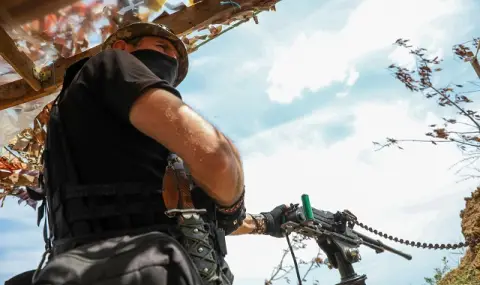The slow and insufficient supplies of Western weapons are likely to prevent Ukraine from equipping any newly created military units. Ukrainian President Volodymyr Zelensky said in an interview with Bloomberg published on July 3 that Ukrainian forces are better positioned in terms of manpower than they were a few months ago, but a future counteroffensive operation depends on equipment.
The commander of a Ukrainian brigade operating near Chasov Yar gave a similar assessment at the tactical level on July 3 - Ukrainian forces in his area of operations need more ammunition than manpower.
Zelensky, however, said it was taking too long for military equipment to arrive at the front. He repeated comments from early June 2024
This is stated in the daily analysis of the Institute for the Study of War (ISW).
Ukrainian media have routinely highlighted this in recent months.
This is crucial to avoid the prolongation of the war that Russian President Vladimir Putin is aiming for. Russia believes it will be able to make creeping progress in Ukraine indefinitely, possibly to incentivize Putin to destroy Ukrainian statehood.
Putin is using existing international organizations focused on Eurasia and led by Russia as a cornerstone for his proposed new alternative "Eurasian security architecture". Russian Defense Minister Andrey Belousov said during a meeting of Commonwealth of Independent States (CIS) defense ministers on July 3 that Putin's recently announced "Eurasian Security Structure" will cover "all areas of activity" and is "open to all Eurasian countries without exception."
Belousov emphasized the importance of the Russian-Belarusian Union State, the Collective Security Treaty Organization (CSTO), the Eurasian Economic Union (EAEU), the CIS and the Shanghai Cooperation Organization (SCO) in the creation of this new Eurasian security architecture.< /p>
Previously, Putin stressed on June 21 that Russia wants to discuss Eurasian security issues with these international organizations and BRICS.
He held bilateral meetings with the leaders of various SCO member states, observers and dialogue partners on the sidelines of the SCO summit on July 3. Among them were the presidents of Turkey Recep Erdogan, China Xi Jinping, Azerbaijan Ilham Aliyev, Pakistan Prime Minister Shehbaz Sharif and others.
The Kremlin's statements about each meeting were largely formulaic - emphasizing a long history of friendly relations, strong trade and growing energy cooperation. All of them presented Russia as part of a network of friendly economic partners in Eurasia despite Western sanctions. Putin is trying to create a coalition of countries bent on acting as an alternative to the West and undermining NATO - China, North Korea, Vietnam and Venezuela.
Ukraine carried out a naval drone strike against Russian naval infrastructure in Novorossiysk, Krasnodar Krai on the night of July 3 and reportedly damaged energy infrastructure during a drone strike against Belgorod Oblast on the night of July 1. The Russian Ministry of Defense (MoD) claims that the Russian Black Sea Fleet (Black Sea) Forces destroyed three Ukrainian naval drones en route to Novorossiysk. The Russian Defense Ministry and Russian bloggers later released footage showing elements of the Black Sea Fleet repulsing naval drones that were reportedly targeting the Russian naval base in Novorossiysk.
The mayor of Novorossiysk, Andrey Kravchenko, confirmed the attack and announced the closure of the beaches. Ukrainian Navy spokesman Captain Third Rank Dmytro Pletenchuk noted on July 3 that the Ukrainian Navy was not yet ready to confirm details of the attack.
ISW has not yet received proof that the attack damaged Russian naval targets.
Ukrainian publisher Suspilne, citing Ukrainian special forces sources, reported on June 3 that a June 1 Ukrainian drone strike "seriously damaged" The Oskol Electrometallurgical Plant (OEMK) in the Belgorod Region.
An unspecified Chinese company and Russian companies are reportedly developing a drone similar to the Iranian-designed Shahed flying munition for Russia to use in Ukraine. Two unspecified European officials told Bloomberg in a July 2 story that unspecified Russian and Chinese companies held talks in 2023 about cooperating to "copy" of Shahed drones and began developing and testing a prototype in 2024.
Officials said the companies are preparing to send the drones to Russia, but Russian forces have not yet used the drones against Ukraine. Bloomberg reported that according to another official familiar with the matter, the United States appreciates that the PRC is not currently providing lethal assistance to Russia, but is sending kits to Russia that Russia can convert into attack drones, while continuing to consider whether to send entirely builds drones for Russia.
ISW cannot independently verify any of these reported employee statements.
Ukrainian President Volodymyr Zelensky said in an interview with Bloomberg published on July 3 that Ukraine has no evidence that the PRC is providing Russia with weapons, but noted that Russia has acquired dual-use goods from the PRC. US Secretary of State Anthony Blinken said on May 1 that exports of dual-use goods have helped Russia significantly increase its defense output. Russia acquires 70 percent of its machine tools and 90 percent of its microelectronics from China.
Providing jointly produced Chinese-Russian munitions to Russia for use in Ukraine would be a significant change in relations and would mean that the Russian president has secured a remarkable concession.
ISW continues to believe that China is trying to present itself as a neutral mediator and maintains the upper hand in relations with Russia.
